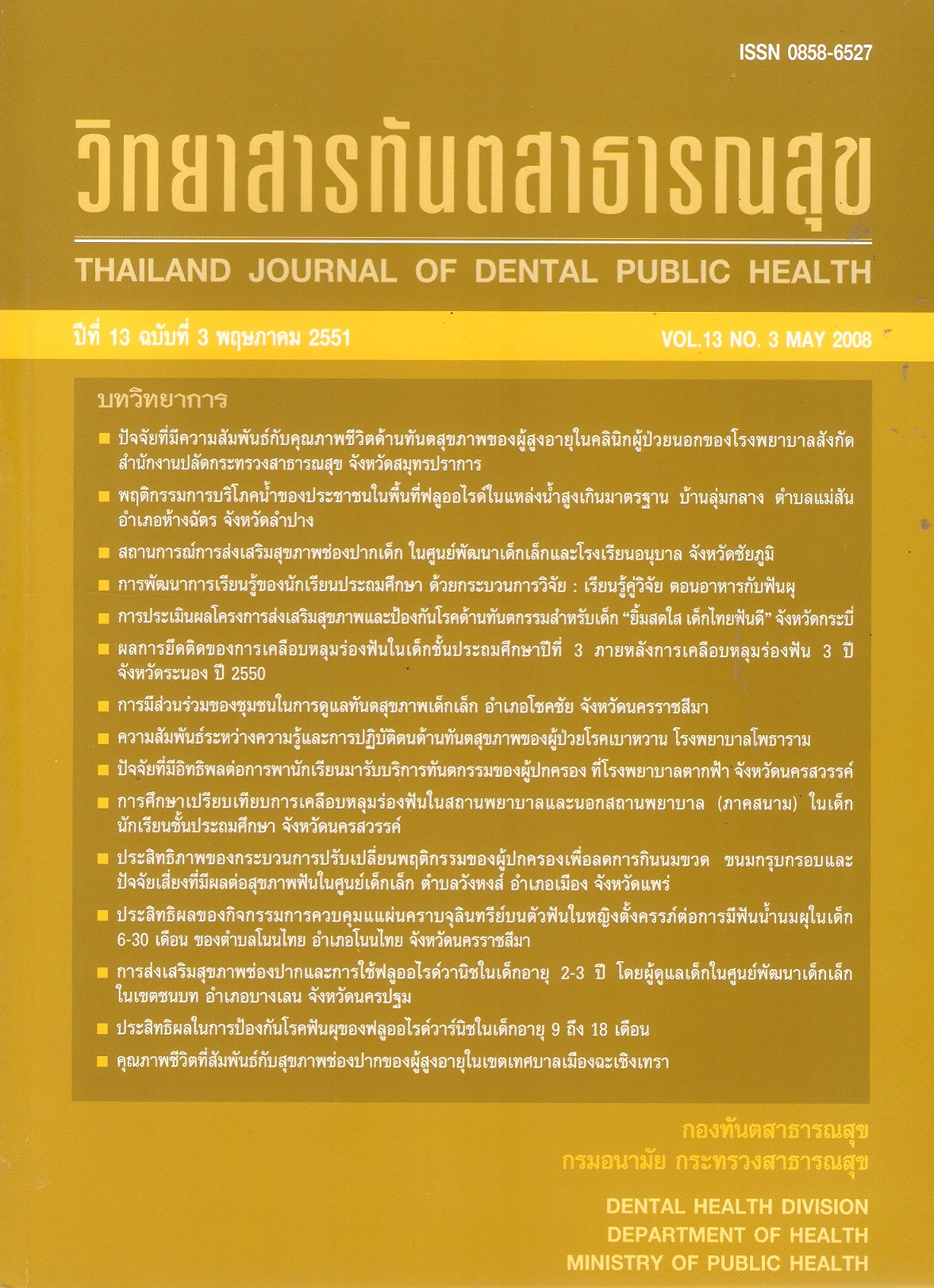Development of learning process in primary school students based on research method : Food Consumption and Dental Caries.
Main Article Content
Abstract
The action research aimed to build scientific thinking skill of primary school teachers and students. The simply survey of food consumption and dental caries of the children were assigned to be an induced research question for the selected core groups. 210 schools from 14 provinces all over the country were purposively selected. 10 students from grade 5 or 6 and 5 teachers from each school was selected as a school researchers. The project set up a workshop for all teams in order to empower the teamwork of the school-teams both in the basic knowledge of survey method and the concept of cariology. The dental personnel were assigned to be a foster team for the school. Their roles were to monitor and supervise the school teams, allocate resources according to the plan of the project and also periodically held team meeting to share their experiences. There were 2100 trained teachers and students involved in the process. All of the schools performed food consumption and dental caries surveys among school children. The survey data were used as an evidence for the school-teams to developed alternatives to solved their problems. There were plenty of innovations and learning technologies from the creativity of the students, such as; a mathematic project of grade 6 students namely “When snack disappear from school”, a scientific project “Effect of milk and carbonated drink on teeth” etc. The main results of the research revealed the objected evidences of oral integrated in health promoting school via school public health policies, physical and social environment of the schools, participation of the parents and community and school curricula both in the “8 key learning areas” and project based learning. The learning model of this research provided the potential of expansion for improved learning capacity of primary school students in scientific thinking.
Downloads
Article Details
References
2. ศิริรักษ์ นครชัย สร้อยสิริ ทวีบูรณ์ บุญนิตย์ ทวีบูรณ์ อารยา พงษ์หาญยุทธ ภัทรวดี ลีลาทวีวุฒิ สุกฤตา จิตต์ไมตรี. การศึกษาผล กระทบของโรคฟันผุต่อคุณภาพชีวิตของเด็ก เครือข่ายเด็กไทยไม่กินหวาน, 2547 (เอกสารโรเนียวเย็บเล่ม) แถม
3. Prasertsom P, Chitchaeng U, Sirichakwal P, Saranachareonpong K, Changban P. Snacks eating behaviors and dental caries status of Thai children aged 3-5 years old. Abstract presented in Pediatric Dentistry Association of Asia, September 2004. Thailand
4. World Health Oraganization. WHO Information Series on School Health (document eleven). Geneva, 2003.
5. วราภรณ์ จิระพงษา ปิยะดา ประเสริฐสม สุณี วงศ์คงคาเทพ. ระบบบริการทันตสุขภาพในประเทศไทย ออนพริ้นท์ช้อพ, กรกฎาคม 2547.
6. กองทันตสาธารณสุข กรมอนามัย กระทรวงสาธารณสุข. รายงานผลการสํารวจทันตสุขภาพ แห่งชาติ ครั้งที่ 5 ประเทศไทย 2544. กรุงเทพฯ: โรงพิมพ์สามเจริญพาณิชย์, 2545
7. ฝ่ายวิชาการและแผนงาน ศูนย์บริหารการผลิตการจําหน่ายและการขนย้ายน้ําตาลทราย สํานักงานคณะกรรมการอ้อยและน้ําตาลทราย ปริมาณการจําหน่ายน้าตาลทรายเพื่อการบริโภคภายในประเทศ. WWW.Sugarzone.in.th
8. ขนิษฐ์ รัตนรังสิมา ปิยะดา ประเสริฐสมสถานการณ์ทันตสุขภาพนักเรียนประถมศึกษา และการจัดบริการส่งเสริมทันตสุขภาพใน โรงเรียนจากผลการสํารวจระดับจังหวัด ปี 2548-2550. www.dental.anamai.moph. go.th/e-book
9. สํานักงานคณะกรรมการการศึกษาขั้นพื้นฐาน กระทรวงศึกษาธิการ. หลักสูตรการศึกษาขั้นพื้นฐาน พ.ศ. 2544
10. http://www.health.nsw.gov.au/publicSe health/health-promotion/settings/schools/whole-school.html. search date 23 May 2008
11. the Victorian Department of Education and Training, the Catholic Education Commission of Victoria and the Association of Independent Schools and Victoria Inc. Researching Numeracy Teaching Approach in Primary Schools. Commonwealth of Australia 2004. ISBN: 0 642 7743 6
12. Thomas WJ. W. A review of research on project-based learning. http://www. autodesk.com/foundation, search date : 23 May 2008
13. P.F.So, S.Y. Keng. The Whole School Approach to Health Education in Tin Shui Wai Methodist Primary School, Hong Kong. J. Primary care and Health Promotion. Vol (1):1; April 2004. 34-39.


